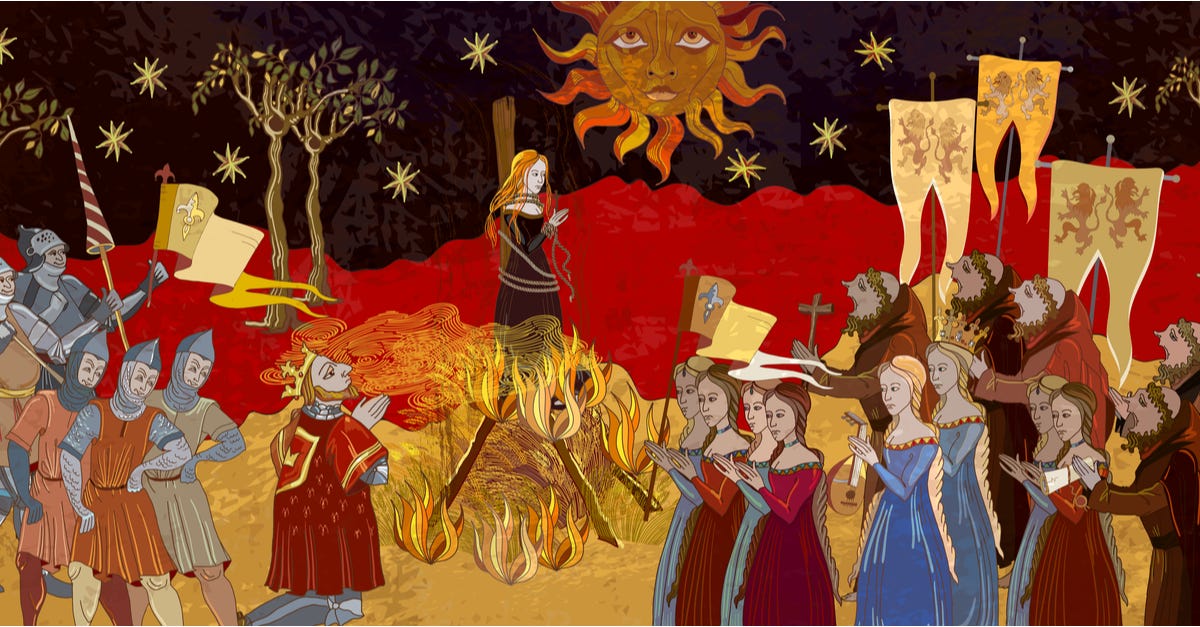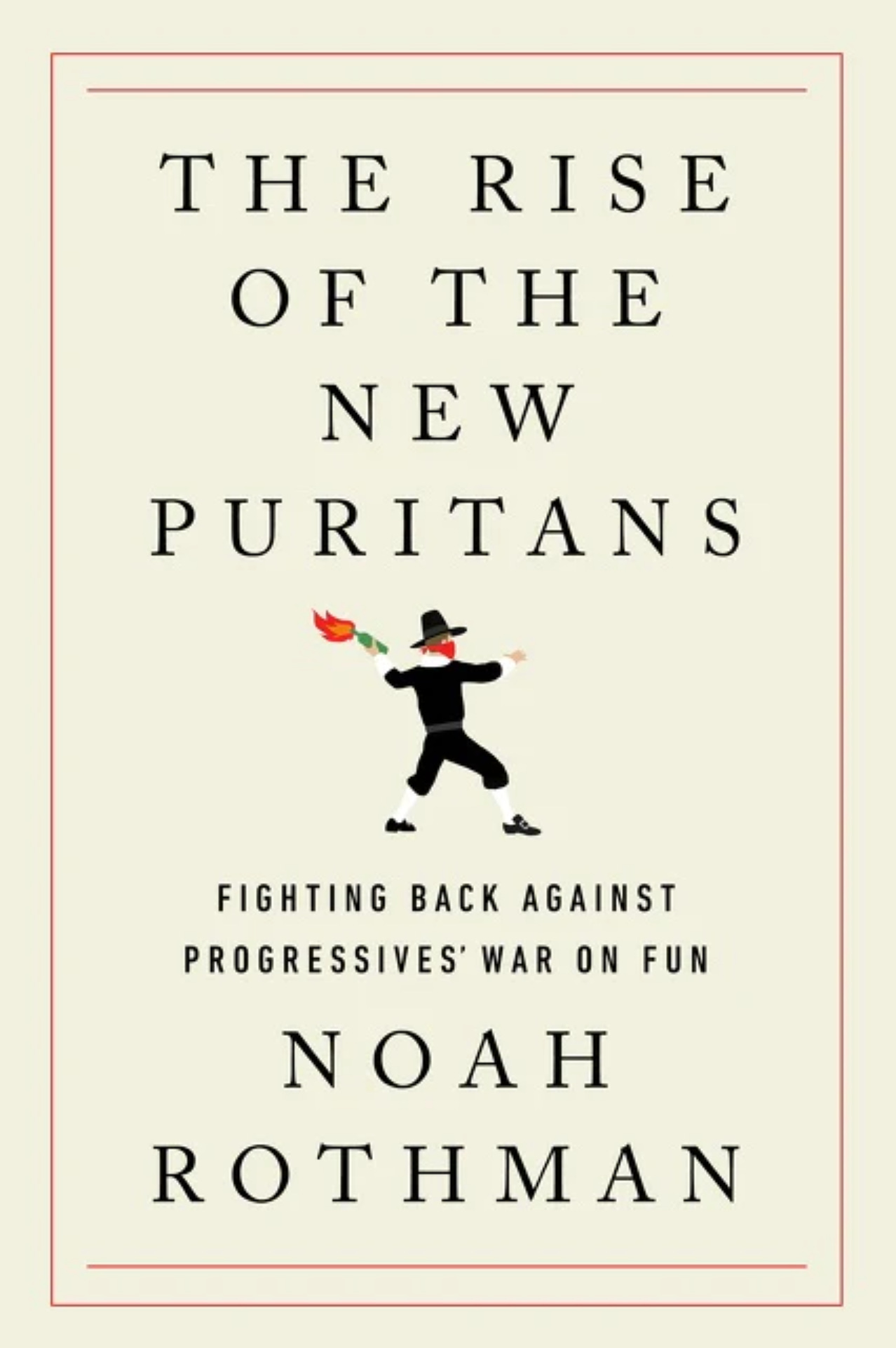E-Pluribus | June 30, 2022
No one expects the Title IX Inquisition!, but they should; in defense of colorblind grammar; and a new book on the New Puritans.
A round-up of the latest and best writing and musings on the rise of illiberalism in the public discourse:
K. C. Johnson: Expect the Title IX Inquisition
With more due process safeguards, writes K. C. Johnson at Tablet Magazine, revisions to Title IX provisions under consideration by the Biden administration will resemble an inquisitorial approach to campus sexual assault complaints rather than a justice-seeking forum.
[T]he sections on campus sexual assault adjudications target the procedural protections from the DeVos regulations with almost surgical precision. Under the proposed Biden rules, accused students would lose the right to cross-examination entirely, unless their college is in a state where a court ruling requires otherwise. They would even lose the right to a live hearing; colleges can satisfy Title IX, according to the proposed guidelines, merely by providing at least two “meetings” between the accused student and an investigator. And instead of a mandate that colleges share evidence from the investigation, the regulations would permit schools to have the investigator initially provide only a “written investigative report that accurately summarizes” the “relevant” evidence. The regulations cite a variety of rationales—making the process easier for accusers, for example, and reducing the financial burden on colleges—for introducing these changes. The provision reminding colleges to respect the rights of accused students was removed “in its entirety,” on grounds of redundancy.
The proposed regulations thus pave the way for the return of the “single-investigator” model, pointing to comments from some college officials looking to increase the number of complaints filed by campus accusers. The Obama administration had encouraged this structure, in which a single person affiliated with the Title IX office serves the combined roles of investigator, prosecutor, judge, and jury in a criminal case. The existing regulations, however, forbid its use on grounds that a system in which accused students can’t see or hear the testimony of witnesses against them is fundamentally unfair. The absence of checks and balances is especially problematic in campus sexual assault adjudications, where colleges are often under enormous scrutiny and pressure—from student activists, the media, elements of the faculty, the federal government, and even occasionally powerful donors—to reach a particular result.
The regulations dubiously cite a handful of academic studies to maintain that an “inquisitorial” approach “is more likely to produce the truth than adversarial methods like cross-examination.” U.S. District Judge F. Dennis Saylor reached a contrary view after handling a lawsuit from a former Brandeis University student who had been found guilty under the single-investigator system. During a hearing on the case, he considered the procedures then used by the university as “closer to Salem 1792 than Boston 2015.” “If we had a time machine,” Saylor continued, “I would be interested in Justice Brandeis’ view of that procedure.”
Read the whole thing.
Douglas Groothuis: Grammar and Whiteness
The effort to define “whiteness” and “blackness” often results in simple stereotyping. At Minding the Campus, Professor Douglas Groothuis punctures one of the recent tropes that has developed about race and grammar, asserting that effective communication is enhanced by shared standards and grammar is an important piece of the puzzle, not a race issue.
As part of the widespread, hysterical reactions to perceived social problems, some are attacking basic mathematics, logic, grammar, and virtues as imperialistic and oppressive. It beggars the imagination, boggles the mind, and turns the stomach, but it’s sadly true. Is it “too white” to insist that 2+2=4? Should we no longer engage in linear thinking, hard work, and differed gratification? Should we cease to use standard grammar, which is normative and essential for human flourishing? After all, these concerns are constitutive of Western culture, which is whiteness writ large. Commit them all to the flames!
The impetus for this revisionism is critical theory, the notion that race, class, and gender are determinative of culture and that “privileged” discourse must be overthrown and replaced with the revolutionary vanguard defending the oppressed. Through this, liberation will come! If this sounds like an outgrowth of Marxism, well, it is.
[ . . . ]
I teach in a graduate school. I grade every paper as an intellectual and literary unit, using the standards of logic and grammar. There is nothing “white” about this. My Korean colleague does so as well, as does my Haitian colleague. Neither English grammar nor logic is pigmented or bigoted. The norms for English grammar, amazingly enough, are rooted in Western history, which, believe it or not, has included a lot of white people (and a lot of other folks, too). But the mastery of English grammar allows and equips anyone to communicate his ideas clearly and effectively. English grammar is not white, or black, or brown, or yellow, or red, or blue. It is the common currency of American culture and is the most common global language (or lingua franca), whether we like it or not. If one wants to advance in any profession in the United States (and in much of the world), proficiency in English is required.
The answer to racial inequality is not to destroy the standard for which the skills strive, but to equip more people to develop the skills to reach the standard. This way, people can more likely attain the ends they want to achieve. I assure Mr. Inoue and his colleagues that spurning grammar and syntax will not help non-whites lead successful lives.
Frederick Douglass proved the slave masters wrong when he learned how to read. When he learned how to write, he wrote books, which left an indelible record of the black man’s ability to transcend circumstance and to excel intellectually. Douglass wrote impeccable English. There was nothing “white” about it. A black man, an ex-slave, wrote eloquent truth that spoke to power about slavery and women’s rights.
Read it all here.
Daniel M. Rothschild: Skewering the Anti-Fun League
Commentary’s Noah Rothman has a new book out and Daniel Rothschild has written an enthusiastic review for Discourse Magazine. Without denigrating the Puritans, Rothschild says Rothman shows how the Left has largely flipped the script and become the party of “no” when it comes to allowing people to simply live their lives as they choose.
If it’s not already clear, Rothman doesn’t use “Puritan” as an insult. Indeed, he praises the virtues of a project that “brought into existence our experiment in self-government, the abolition of slavery, and a social contract that ensures society’s most vulnerable are not dependent upon charity alone in their darkest hours.” Rothman is similarly charitable when discussing the ends of the New Puritans; he notes that “the modern progressive project is, in the abstract, devoted to promoting goals and ideals to which few would object.” The problems lie in the specifics of those goals—and the means which the New Puritans use to enact them.
Rothman acutely critiques these means, especially the totalizing approach wherein nothing is outside the purview of the self-appointed cultural arbiters, and the goal is not just to change public policy and political life but to fundamentally refashion society. As with their prerevolutionary brethren, the New Puritans perhaps have noble or at least defensible impulses, but their totalizing approach is antithetical to the liberal constitutional and epistemic traditions of the United States.
[ . . . ]
The New Puritans have also overplayed the idea famously articulated by Andrew Breitbart that “politics is downstream of culture.” Regardless of the merits of this claim, the ability of a cultural revolution to instantiate itself in our politics is limited by American political tradition and constitutional order (as stretched and stressed as those have been in this century). “Political activism, fully apprehended, is not a transcendental experience,” Rothman notes. “The work of politics in the United States is never going to be emancipatory.” Cultural Jacobinism simply does not map onto the American political order—by design, and for good reason. Big political changes take a long time; the recent Supreme Court decision in Dobbs, for instance, was the result of two generations of intellectual and political work by the anti-abortion movement.
Today, bookshelves sag under the weight of tomes written by critics of anti-pluralistic, illiberal political movements gaining traction on the right, as well as by historians of the dour and judgmental strands of thought that ran through much of the 20th century’s social conservative movement. By exploring and analyzing the new threats to liberalism from the totalitarian corners of extreme progressivism, Rothman does a great service for readers trying to make sense of a movement that feels foreign to those of us who grew up steeped in late 20th-century American liberalism. It turns out that illiberal ideas about perfecting society through a totalizing politics and intellectual monoculture have a uniquely American genesis.
Read it all.
Around Twitter
Recently, Conor Friedersdorf has been floating the idea of allowing college faculty to push back against overreach by campus DEI personnel. Some excerpts:
Perhaps “highlights" would be more accurate than “outtakes,” but via Glenn Loury, he and John McWhorter discuss the discourse on race:
And finally, Foundation for Individual Rights & Expression, we see what you did there:










